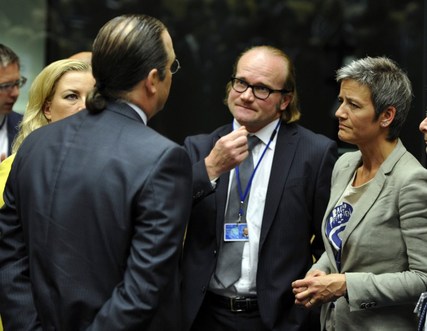EU Ministers Hold Crunch Talks on Bank Rescues

EU finance ministers began talks in Brussels on Wednesday aimed at agreeing rules on future bank rescues -- a sensitive issue in efforts to prevent another eurozone debt crisis.
Marathon talks between the finance ministers last week ended with no deal and the latest negotiations come on the eve of a summit of EU leaders where an agreement would be formalized.
The crux of the matter is who foots the bill when a bank falters, and what room for manoeuvre governments can have to decide a strategy for dealing with the situation after widely differing experiences in Europe in recent years.
The issue is a touchy one because it will decide what costs bank shareholders, creditors and account holders will bear in "bail-ins" -- when lenders are forced to assume losses instead of turning to governments for state funds.
A draft proposal last week foresaw shareholders taking initial losses, followed by creditors, bond holders and finally depositors with more than 100,000 euros in their accounts.
There are two main camps in the talks.
The first group includes Britain and France, which want to afford EU nations greater flexibility to decide how to deal with banking crises on a case-by-case basis.
Other countries, like Finland, Germany and the Netherlands, want the strictest and widest-ranging possible rules to avoid uncertainty which could scare off investors.
They also want to avoid any use of public funds in future crises -- a method that stoked public anger against many governments during the crisis.
"It is very important that we have the same rules in all countries and also some kind of flexibility," said Dutch Finance Minister Jeroen Dijsselbloem, who is head of the Eurogroup.
Irish Finance Minister Michael Noonan, who chairs the talks as Ireland holds the EU's rotating presidency, said: "I'm expecting another long night but I think we'll work it out."
But Swedish Finance Minister Anders Borg was far more pessimistic, saying: "We're quite far from a solution.
"I think the solution that is now on the table is actually quite risky in terms of an increased risk of contagion and also an increased risk that we see slower recovery," he said.
An EU diplomat speaking on condition of anonymity said: "The main problem last week was a Franco-German problem."
"Let's hope they sort it out," he said.



